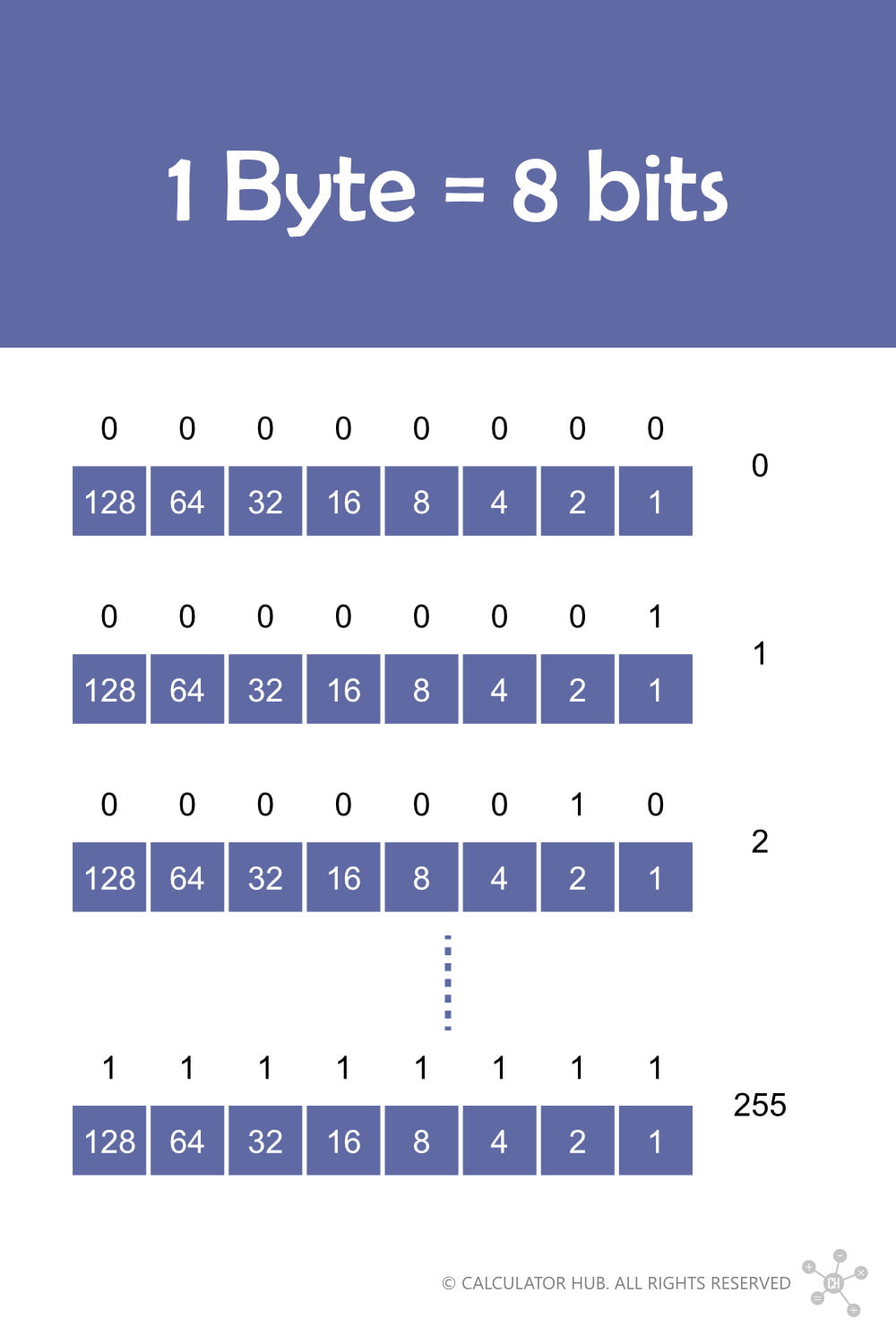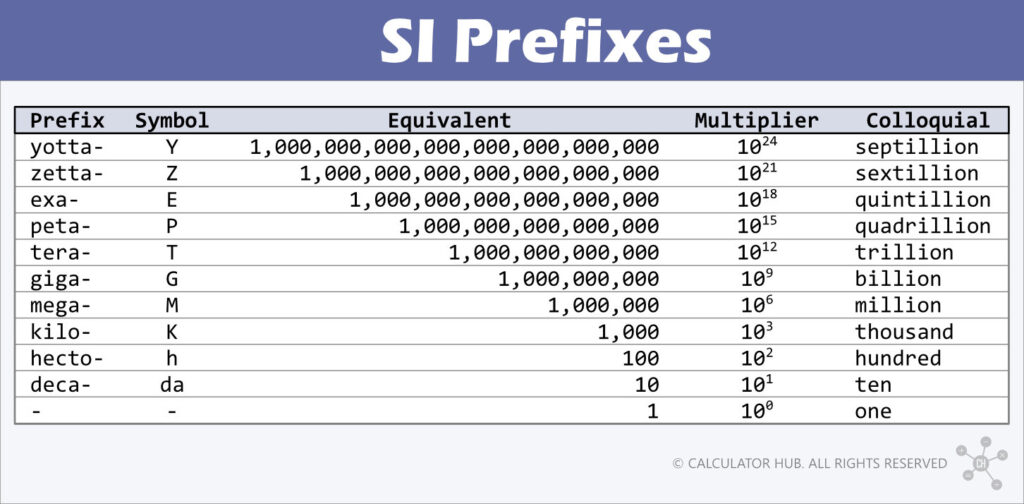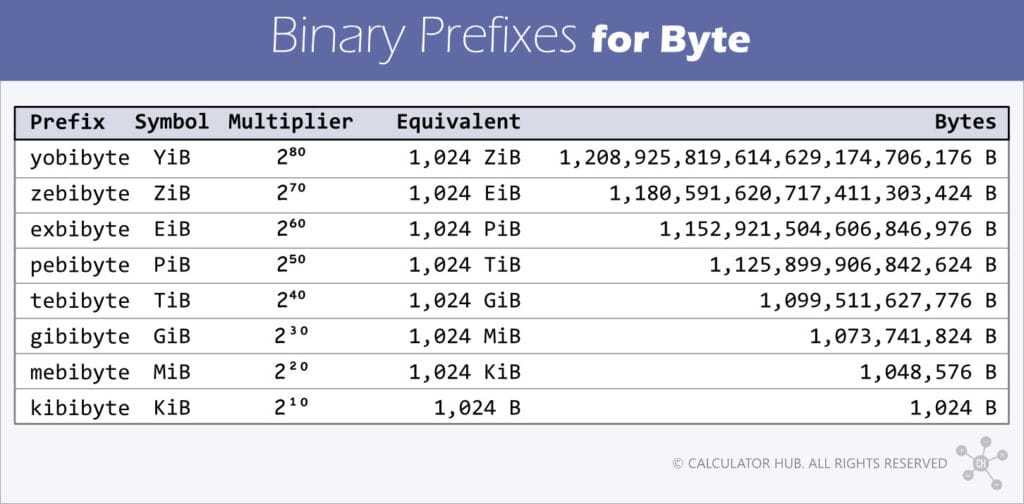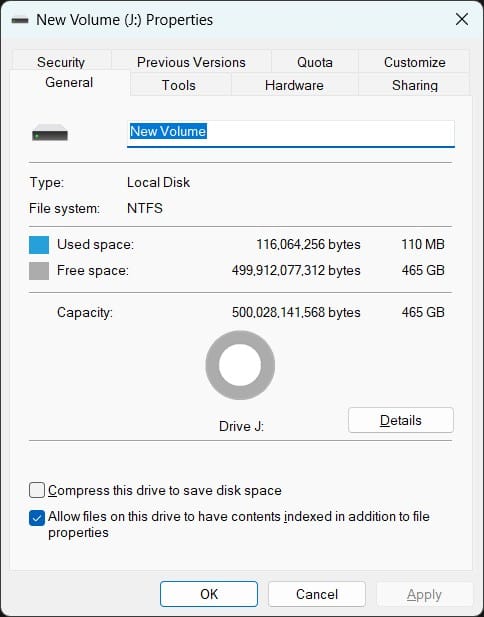In this article, we’ll show you how to convert data from gigabytes (GB) to bytes (B). We will cover essential definitions, provide examples, share relevant formulas, and present tables, along with answers to common questions.
Definitions of Byte and GB
Let’s get started by understanding the key definitions and differences between Byte and Gigabyte. Understanding these terms will allow you to perform conversions confidently.
What is a byte (B)?
A Byte (B) is a standard unit of digital information used for data storage. It consists of 8 bits, which gives it a total of 256 possible values (from 0 to 255).

With such amount of potential values, a byte can represent many fundamental digital information, including characters in the ASCII (American Standard Code for Information Interchange) encoding system, numbers, color components, network packets, control code, and other information that fits in a byte.
What is a Gigabyte (GB)?
A gigabyte (GB) is a unit of measurement for data storage used to measure device capacity, files, or memory that are large in size, typically between one billion and one trillion bytes.
It has symbols or abbreviations such as GB, Gbyte, GiB, or Gibyte.

When using International System of Units (SI) prefixes[1], which are based on powers of 10, a gigabyte (GB) equals 1,000,000,000 bytes.
1 GB = 103 MB = 1,000 MB1 GB = 109 B = 1,000,000,000 B
When using International Electrotechnical Commission (IEC) binary prefixes[2], which are based on powers of 2, a gigabyte (GB) equals 1,073,741,824 bytes.
1 GiB = 210 MiB = 1,024 MiB1 GiB = 230 B = 1,073,741,824 B
Gigabyte to byte formula
Let’s take a closer look at the conversion formula so you can carry out these conversions independently, whether using a calculator or doing it manually with pencil and paper.
Using decimal (SI) prefixes
The giga- prefix in the International System of Units (SI) represents a multiplier of 109 (1,000,000,000).

So, to convert from gigabyte to byte, multiply the number of gigabytes (NGB) by the multiplier (1,000,000,000).
NB = NGB × 1,000,000,000
Or remember the GB-to-B conversion factor: 1 GB = 1,000,000,000 B
Using binary (IEC) prefixes
The gibi- prefix in the International Electrotechnical Commission (IEC) represents a multiplier of 230 (1,073,741,824).

So, to convert from gibibyte to byte, multiply the number of gibibytes (NGiB) by the multiplier (1,073,741,824).
NB = NGiB × 1,073,741,824
Or remember the GiB-to-B conversion factor: 1 GiB = 1,073,741,824 B
Examples
Now, let's take a look at an example that illustrates the calculations required to convert from gigabytes to bytes (GB to B).
Example
Imagine you’ve just purchased a new external hard drive advertised as having 500GB of storage. Excited to back up all your photos, videos, and documents, you connect it to your computer, only to find that the available storage is less than 500GB. You see something like 465GB instead.

You realize that operating systems report storage size using binary units, which may differ from the manufacturer. To understand this difference, you convert 500 gigabytes into bytes using decimal and binary standards to determine which one the manufacturer employed.
Using decimal (SI) prefixes
Since 1 gigabyte (GB) equals 109 (1,000,000,000) bytes, we can convert 500 GB to bytes by using the following formula:
So, the 500 GB hard drive, when expressed in decimal units, is equivalent to 500,000,000,000 bytes.
Alternatively, you can use our calculator by entering 500 into the GB box, and you instantly get the storage value in bytes, in this case, 500,000,000,000 B.

Using binary (IEC) prefixes
Since 1 gibibyte (GiB) equals 230 (1,073,741,824) bytes, we can convert 500 gibibytes to bytes by using the following formula:
So, the 500 GB hard drive, when expressed in binary units, is equivalent to 536,870,912,000 bytes.
Alternatively, you can use our calculator by entering 500 into the From box, choose GiB from the From unit box, and you instantly get the storage value in bytes, in this case, 536,870,912,000 B.

From your calculations, you can assume that the manufacturer used decimal (SI) prefixes[3] to determine the hard drive’s capacity. Therefore, the actual capacity of the 500 GB hard drive is 500,000,000,000 bytes.
Using our calculator, you can convert the 500 billion bytes to gibibytes that match the exact capacity reported by the operating system, approximately 465.66 GiB.

Gigabyte to byte conversion table
The conversion table below provides a handy reference for converting data storage capacity from gigabytes (GB) to bytes (B). It covers a range from 0.1 GB to 1,000 GB, allowing for easy and quick conversions between these units of measurement.
Decimal (SI) prefixes
| Gigabytes | Bytes |
|---|---|
| 0.1 GB | 100,000,000 B |
| 0.5 GB | 500,000,000 B |
| 1 GB | 1,000,000,000 B |
| 2 GB | 2,000,000,000 B |
| 4 GB | 4,000,000,000 B |
| 5 GB | 5,000,000,000 B |
| 10 GB | 10,000,000,000 B |
| 20 GB | 20,000,000,000 B |
| 30 GB | 30,000,000,000 B |
| 40 GB | 40,000,000,000 B |
| 50 GB | 50,000,000,000 B |
| 60 GB | 60,000,000,000 B |
| 70 GB | 70,000,000,000 B |
| 80 GB | 80,000,000,000 B |
| 90 GB | 90,000,000,000 B |
| 100 GB | 100,000,000,000 B |
| 200 GB | 200,000,000,000 B |
| 500 GB | 500,000,000,000 B |
| 800 GB | 800,000,000,000 B |
| 1000 GB | 1,000,000,000,000 B |
Binary (IEC) prefixes
| Gibibytes | Bytes |
|---|---|
| 1 GiB | 1,073,741,824 B |
| 2 GiB | 2,147,483,648 B |
| 4 GiB | 4,294,967,296 B |
| 5 GiB | 5,368,709,120 B |
| 10 GiB | 10,737,418,240 B |
| 20 GiB | 21,474,836,480 B |
| 30 GiB | 32,212,254,720 B |
| 40 GiB | 42,949,672,960 B |
| 50 GiB | 53,687,091,200 B |
| 60 GiB | 64,424,509,440 B |
| 70 GiB | 75,161,927,680 B |
| 80 GiB | 85,899,345,920 B |
| 90 GiB | 96,636,764,160 B |
| 100 GiB | 107,374,182,400 B |
| 200 GiB | 214,748,364,800 B |
| 500 GiB | 536,870,912,000 B |
| 800 GiB | 858,993,459,200 B |
| 1000 GiB | 1,073,741,824,000 B |
FAQs
Is 1 byte or 1 gigabyte larger?
A gigabyte (GB) is a billion times bigger than a byte (B). Here are the relationships between the units:
Decimal prefixes
1 GB = 109 = 1,000,000,000 B1 B = 10-9 = 1 ÷ 1,000,000,000 = 0.000000001 GB
Binary prefixes
1 GiB = 230 = 1,073,741,824 B1 B = 2-30 = 1 ÷ 1,073,741,824 = 0.000000000931322574615478515625 GiB
How to convert from gigabytes to bytes?
To convert data storage from gigabytes (GB) to bytes (B), follow these simple steps based on the standard you are using:
- Write down the data storage value in
gigabytes (GB).
Decimal (SI) prefixes
- Multiply it by the value of a
GB-to-Bconversion factor:109or1,000,000,000. - The result from multiplication is the value of the data storage in
bytes (B).
Binary (IEC) prefixes
- Multiply it by the value of a
GiB-to-Bconversion factor:230or1,073,741,824. - The result from multiplication is the value of the data storage in
bytes (B).
You now know how to convert data storage capacity from gigabytes (GB) to bytes (B). You can quickly use our calculator to convert between the data storage units to save time for future calculations.
For further understanding, check our data storage converter page to learn more about the differences between decimal and binary units of data storage.

